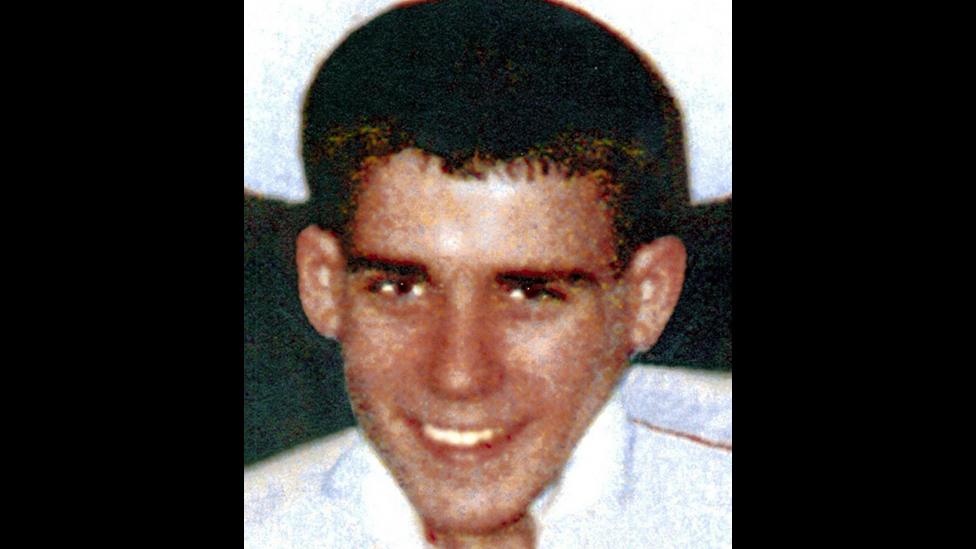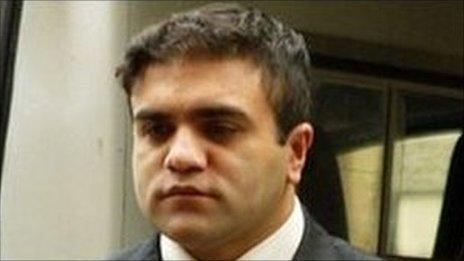Kriss Donald killer Imran Shahid wins human rights appeal
- Published
Shahid is serving a life sentence for murdering 15-year-old Kriss Donald in 2004
A man who led a gang in the racist murder of a Glasgow schoolboy had his human rights violated by being kept in solitary confinement, the UK's Supreme Court has ruled.
Imran Shahid is serving a minimum of 25 years for murdering Kriss Donald in 2004.
The court said that he had been unlawfully kept in solitary confinement for a total of 14 months.
It ruled that this had violated the European Convention on Human Rights.
But the judges also ruled that Shahid would not be eligible for damages.
Kriss Donald was abducted in the Pollokshields area of Glasgow, stabbed several times, and then set on fire.
Gang leader
Shahid, his brother Zeeshan Shahid and Faisal Mushtaq were all sentenced to life in November 2006 after being found guilty of murdering the 15-year-old.
He was said to have led the gang which snatched Kriss because he was white.
During his time in the Scottish prison system, Shahid has spent four years and eight months in segregation, but the Supreme Court ruled that only 14 months of that time had been unlawful.

Kriss Donald was snatched off the street purely because he was white, before being stabbed and then set on fire
His bid to win damages for the time he spent in solitary confinement had previously been rejected by the Court of Session, with judge Lord Malcolm ruling that segregation had been necessary for safety reasons.
Shahid was attacked by another inmate at HMP Edinburgh in 2011 after being allowed to return to the mainstream population.
Shahid then took his appeal to the Supreme Court, which has now unanimously allowed his appeal under Article 8 of the European Convention on Human Rights, which deals with the the right to respect for private life.
Prison governors are allowed to authorise segregation for up to 72 hours, with any extension to that period needing to be authorised by Scottish ministers before the 72 hour period expires.
In their written ruling, the Supreme Court judges said that several orders made on behalf of the ministers authorising Shahid's continued segregation had been granted after the 72 hours had expired.
They added: "Consequently, the appellant's segregation for periods totalling about 14 months lacked authorisation under the prison rules."
'Not inhuman'
While Shahid was placed in solitary confinement for his own safety, the judges said that consideration should have been given to moving him to another prison elsewhere in the UK.
They also said that no meaningful plan for his reintegration into the prison population was put in place until he had already been in segregation for more than four and a half years.
And they said ministers had also failed to demonstrate that the period for which Shahid was kept in segregation was proportionate.
Shahid and his co-accused had first been segregated for their own protection after being remanded in custody while awaiting trial in 2005.
Apart from a period immediately before and during his trial, Shahid remained in segregation until August 2010, a period of 56 months.
The Supreme court ruling said it was "exceptional" for a prisoner to be kept in segregation for such a long period in Scotland.
However, the judge noted that: "The conditions in which he was kept were not inhuman or degrading. The purpose of his segregation was to protect his safety, and there were reasonable grounds for believing that he was at risk of attack.
"He was not entirely isolated from contact with other prisoners and staff. He suffered some ill effects from his prolonged segregation, but his health does not appear to have been severely or permanently affected."
'Victory'
A spokesperson from Mr Shahid's lawyers, Taylor & Kelly, said: "The Supreme Court has taken the opportunity of referring to international standards and reports which have consistently held that segregation beyond 15 days will cause a detriment and should be resorted to only when necessary.
"In Mr Shahid's case segregation was used for a period of nearly five years. The Supreme Court records this as 'exceptional'.
"Mr Shahid's victory today will hopefully ensure that, for the future, that period is never repeated and that the prison rules will be observed."
The Scottish Prison Service said it was considering the judgement - and whether or not there needs to be any further change to its procedures.
- Published11 October 2011

- Published5 August 2011
